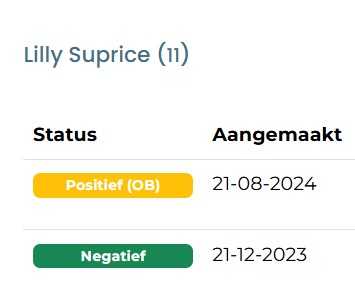My horse tested positive, but does not need treatment – how is that possible?
It can be confusing: you have a fecal test done and the result comes back positive. Yet, the advice is not to treat. How is that possible? We’ll explain.
Worms are normal
Many horse owners are alarmed when they hear that their horse is shedding worm eggs. The impression quickly arises that any trace of worms is dangerous. But did you know that every horse carries worms? Even a horse that has just been dewormed is never completely free of worms. A small worm population is perfectly normal and does not cause problems in a healthy horse.
When do we treat?
The main reason for doing a fecal test is to gain insight into the level of infection. Only when the result exceeds a certain threshold does it pose a risk to the horse’s health and increase the infection pressure on the pasture. In such cases, treatment with a dewormer is necessary.
With a low result, however, treatment is not needed. Unnecessary deworming can lead to resistance, making dewormers less effective in the future. We want to avoid that. Treatment should always be proportional to the values found.
The advice behind the result
A result without treatment advice would be confusing. That’s why at Worm&Co you always receive clear, tailored advice. We don’t just look at the worm eggs found, but also at factors such as:
• The age of the horse
• The season
• Housing (stable, paddock, pasture)
• Pasture hygiene
• Any symptoms or special circumstances
So it may be that your horse tested positive, but the result shows that the infection is so low that there is no risk. In that case, treatment is not useful.
Positive, yet healthy
A horse with a light infection can remain perfectly healthy. In fact, a certain level of exposure helps horses build natural resistance against worms. The goal is therefore not to eradicate all worms, but to maintain balance.
What can you do yourself?
Even without treatment, there are steps you can take to keep the worm burden low:
• Remove manure regularly from the pasture or paddock
• Carry out fecal tests frequently (3–4 times per year)
• Rotate pastures in time
• Prevent overgrazing
Conclusion
A positive result does not automatically mean your horse is ill or needs treatment. It is about the level of infection and the circumstances of your horse. By combining fecal testing with expert advice, you can be sure to treat only when truly necessary – keeping your horse healthy without unnecessary medication.

